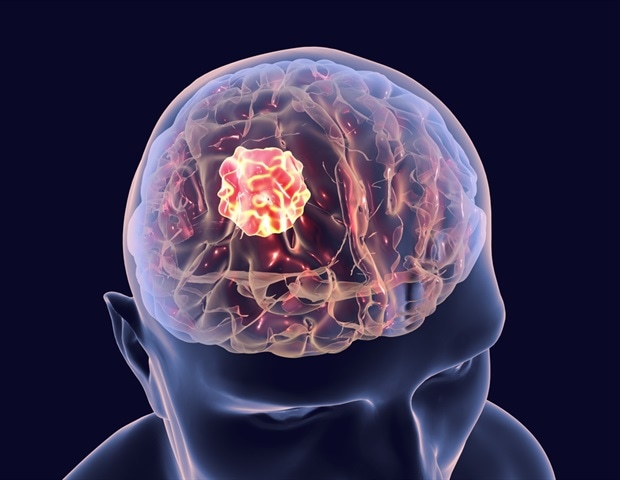
Glioblastoma, the most common and deadly form of brain cancer, grows rapidly to invade and destroy healthy brain tissue. The tumor sends out cancerous tendrils into the brain that make surgical tumor removal extremely difficult or impossible.
Now, Salk scientists have found the immunotherapy treatment anti-CTLA-4 leads to considerably greater survival of mice with glioblastoma. Furthermore, they discovered that this therapy was dependent on immune cells called CD4+ T cells infiltrating the brain and triggering the tumor-destructive activities of other immune cells called microglia, which permanently reside in the brain.
Published in Immunity on August 11, 2023, the findings show the benefit of harnessing the body’s own immune cells to fight brain cancer and could lead to more effective immunotherapies for treating brain cancer in humans.
There are currently no effective treatments for glioblastoma-;a diagnosis today is basically a death sentence. We’re extremely excited to find an immunotherapy regimen that uses the mouse’s own immune cells to fight the brain cancer and leads to considerable shrinkage, and in some cases elimination, of the tumor.”
Professor Susan Kaech, senior author and director of the NOMIS Center for Immunobiology and Microbial Pathogenesis
When standard cancer treatments like surgery, chemotherapy, and radiation cease to be effective, doctors increasingly turn to immunotherapy. Immunotherapy encourages the body’s own immune cells to seek and destroy cancer cells. Though not universal, immunotherapy works on many tumors and has provided many patients with strong, long lasting anti-cancer responses. Kaech wanted to find new ways of harnessing the immune system to develop more safe and durable treatments for brain cancer.
Her team found three cancer-fighting tools that have been somewhat overlooked in brain cancer research that may cooperate and effectively attack glioblastoma: an immunotherapy drug called anti-CTLA-4 and specialized immune cells called CD4+ T cells and microglia.
Anti-CTLA-4 immunotherapy works by blocking cells from making the CTLA-4 protein, which, if not blocked, inhibits T cell activity. It was the first immunotherapy drug designed to stimulate our immune system to fight cancer, but it was quickly followed by another, anti-PD-1, that was less toxic and became more widely used. Whether anti-CTLA-4 is an effective treatment for glioblastoma remains unknown since anti-PD-1 took precedence in clinical trials. Unfortunately, anti-PD-1 was found to be ineffective in multiple clinical trials for glioblastoma-;a failure that inspired Kaech to see whether anti-CTLA-4 would be any different.
As for the specialized immune cells, CD4+ T cells are often overlooked in cancer research in favor of a similar immune cell, the CD8+ T cell, because CD8+ T cells are known to directly kill cancer cells. Microglia live in the brain full time, where they patrol for invaders and respond to damage-;whether they play any role in tumor death was not clear.
First, the researchers compared the life spans of mice with glioblastoma when treated with anti-CTLA-4 versus anti-PD-1. After discovering that blocking CTLA-4 prolonged their life spans considerably, but blocking PD-1 did not, the team moved on to figure out what made that outcome possible.
They found that after anti-CTLA-4 treatment, CD4+ T cells secreted a protein called interferon gamma that caused the tumor to throw up “stress flags” while simultaneously alerting microglia to start eating up those stressed tumor cells. As they gobbled up the tumor cells, the microglia would present scraps of tumor on their surface to keep the CD4+ T cells attentive and producing more interferon gamma-;creating a cycle that repeats until the tumor is destroyed.
“Our study demonstrates the promise of anti-CTLA-4 and outlines a novel process where CD4+ T cells and other brain-resident immune cells team up to kill cancerous cells,” says co-first author Dan Chen, a postdoctoral researcher in Kaech’s lab.
To understand the role of microglia in this cycle, the researchers collaborated with co-author and Salk Professor Greg Lemke, holder of the Françoise Gilot-Salk Chair. For decades, Lemke has investigated critical molecules, called TAM receptors, used by microglia to send and receive crucial messages. The researchers found that TAM receptors told microglia to gobble up cancer cells in this novel cycle.
“We were stunned by this novel codependency between microglia and CD4+ T cells,” says co-first author Siva Karthik Varanasi, a postdoctoral researcher in Kaech’s lab. “We are already excited about so many new biological questions and therapeutic solutions that could radically change treatment for deadly cancers like glioblastoma.”
Connecting the pieces of this cancer-killing puzzle brings researchers closer than ever to understanding and treating glioblastoma.
“We can now reimagine glioblastoma treatment by trying to turn the local microglia that surround brain tumors into tumor killers,” says Kaech, holder of the NOMIS Chair. “Developing a partnership between CD4+ T cells and microglia is creating a new type of productive immune response that we have not previously known about.”
Next, the researchers will examine whether this cancer-killing cell cycle is present in human glioblastoma cases. Additionally, they aim to look at other animal models with differing glioblastoma subtypes, expanding their understanding of the disease and optimal treatments.
Other authors include Toshiro Hara, Kacie Traina, Ming Sun, Bryan McDonald, Yagmur Farsakoglu, Josh Clanton, Shihao Xu, Lizmarie Garcia-Rivera, Thomas H. Mann, Victor Du, H. Kay Chung, Ziyan Xu, Victoria Tripple, Eduardo Casillas, Shixin Ma, Carolyn O’Connor, Qiyuan Yang, Ye Zheng, and Tony Hunter of Salk.
The work was supported by the National Institutes of Health (CA195613), Cancer Research Institute, Damon Runyon Cancer Research Foundation, and a National Cancer Center fellowship.
Source:
Journal reference:
Chen, D., et al. (2023) CTLA-4 blockade induces CD4+ T cell IFNγ-driven microglial phagocytosis and anti-tumor function in glioblastoma. Immunity. doi.org/10.1016/j.immuni.2023.07.015.










